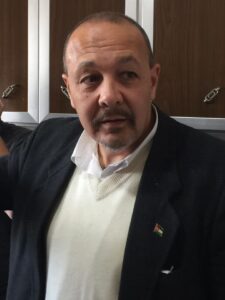Basel Burgan, the head of a successful family pharmacy business and a prominent environmental champion in Jordan, is accused of cyber crimes and spreading rumors “that damaged a government institution.” Hearings in the case against him began in September, continuing every other week. Unless the case is dismissed, and barring additional delay due to the COVID-19 pandemic, a verdict by next spring could lead to a sentence of 6-24 months in prison for Burgan.
The case against the activist businessman began on January 4, 2019, when Saleh Ghbain, a Jordanian scientist working in the U.S. who had formerly worked as a consultant to the Jordanian Atomic Energy Commission (JAEC), released a document on Facebook which he said proved that the Research Nuclear Reactor (RNR), recently constructed at the Jordan University of Science and Technology by a Korean contractor, has “cracks in its design and is leaking radiation.”
In Jordan, Burgan shared the report on Facebook, commenting that “if the leaked radiation is high, then it is a health problem…. We need all security agencies to check this issue.”
On January 7, the JAEC released a statement explaining that the leaked document referred to a test that was conducted in March, 2018 to check if the new reactor building is well sealed and its air circulation contained. Many spots leaking air were discovered, but the JAEC said it had not reported any radiation leaks. After reading the JAEC statement that identified the controversial document as a genuine test report, Burgan deleted his first Facebook post on January 8 and published a new post stating, “Thank God there is no radiation at the RNR.”
But by then the JAEC had already filed a complaint, alleging that according to Article 75 of the Communications Law, Burgan had “spread false information that leads to concern and affects a public institution,” and that posting his concerns on Facebook had violated Article 15 of the Cyber Crimes Law.
On March 19, 2019, a Tuesday, Burgan was accompanied by his attorney when he answered a summons for questioning by the state prosecutor. Within ten minutes, the prosecutor had determined Burgan to be such a threat to Jordanian society for sharing Ghbain’s post that he should be imprisoned for at least one week under adminstrative detention, and that could be renewed indefinitely week by week.
Many environmental, civil society and grassroots groups and organizations quickly issued statements expressing concern about his detention and calling for his immediate release. A petition demanding his release launched by activists, friends and family was quickly signed by 34 such groups, including the Pharmacists Professional Association of which Burgan is a member.
Three members of Jordan’s parliament tried to meet with the prosecutor and demand Burgan’s immediate release, but the official evaded them for days. For the MPs and most Jordanians, such evasions are seen as a common practice when activists are arrested, serving to keep them detained over the weekend of Friday and Saturday. On Sunday, the public attorney’s office was swamped with politicians demanding Burgan’s release. The next day, Burgan was let out on $7,000 bail.
In court this fall, testimony has so far only been taken from witnesses called by the JAEC. Under oath, the First Commissioner at JAEC testified there had been an accident at the research reactor involving radioactive Iodine-131, but without a clear description of what happened. He also stated that the International Atomic Energy Agency (IAEA) in Vienna had asked “why (JAEC) did not inform” the international governing agency of the accident. True to form, he claimed the release “does not have any effect on the environment.”
Prior to this testimony, the accident and leak had not been reported in Jordanian media. Testifying later, a member of the Jordanian Atomic Protection and Safety Committee overseeing the RNR also said he’d never been informed about the leak. Yet the judge declared that this testimony about a radiation leak was not in fact evidence (“daleel”), but a much less legally significant presumption (“qarinah”).
Other witnesses said they were sure there were no radiation leaks, citing air samples taken at unspecified locations in the days after Ghbain had released the test report in January, 2019. Even if there had been a leak in March, 2018, when the report was written, any iodine-131, having a half-life of about 8 days, would no longer have been detectable.
As further evidence of the court’s bias in the proceedings, Judge Mohammad Tarawneh responded harshly when Burgan’s lawyer asked that the clerk of the court correct a written report of witness testimony. “Why are you reacting this way? You should concentrate on the elements of your client’s crime,” he demanded.
Burgan’s lawyer Ms. Hala Ahed immediately asked the judge, “Your Honor, do you think the crime is already fixed or proven?”
The judge became angry and raised his voice, telling her “not to put words to my mouth!”
How you can help
Public pressure in Jordan helped to get Basel Burgan free on bond pending trial. Now, international support is needed to help release him from these outrageous charges that threaten to stop his environmental and anti-nuclear advocacy. The Jordanian Atomic Energy Commission has failed to show by the testimony of its witnesses in court that it was “damaged” in any negative way, except for receiving phone calls from some Jordanian officials, due to the Facebook posts.
Individuals and non-governmental organizations are asked to please write to the Jordanian Prime Minister’s office to express concern over the prosecution of Basel Burgan and demand the charges against him be dismissed. Write via email to info@pm.gov.jo or fax to +96264642520, or by postal mail to: Prime Ministry of Jordan, P.O. Box 80, Amman 11180, Jordan.
